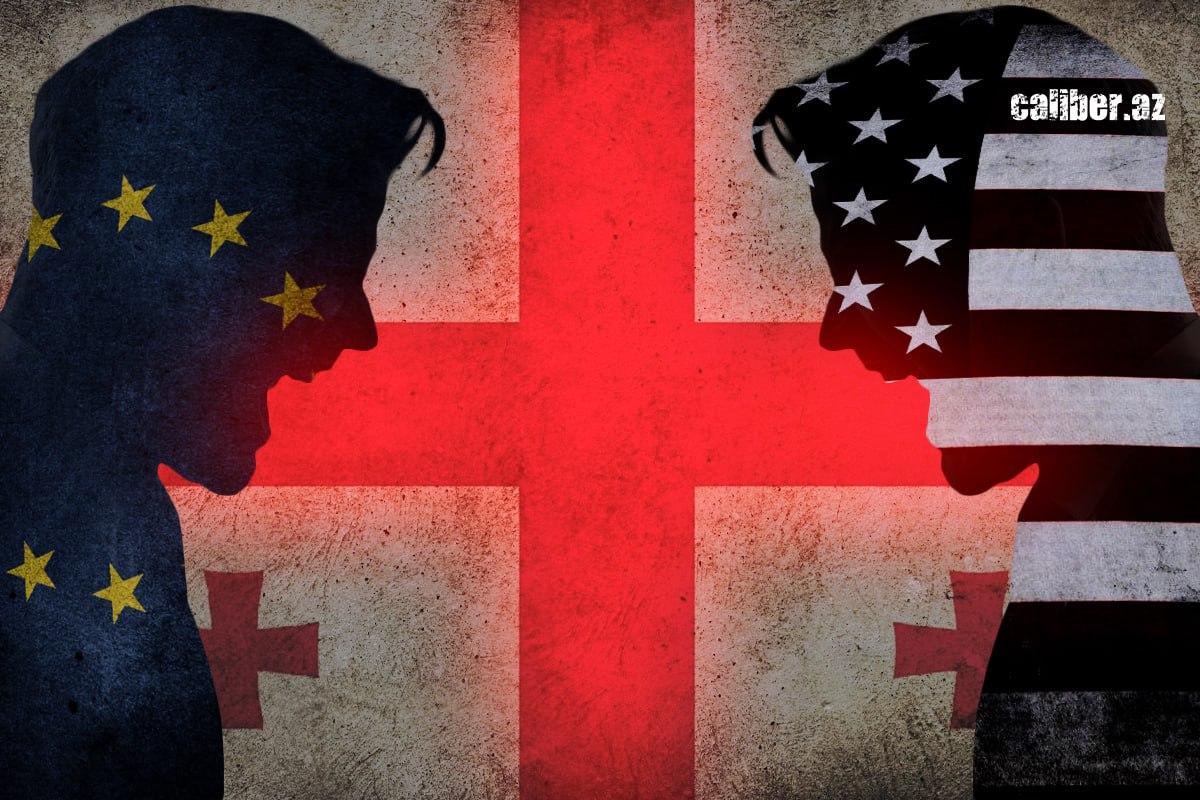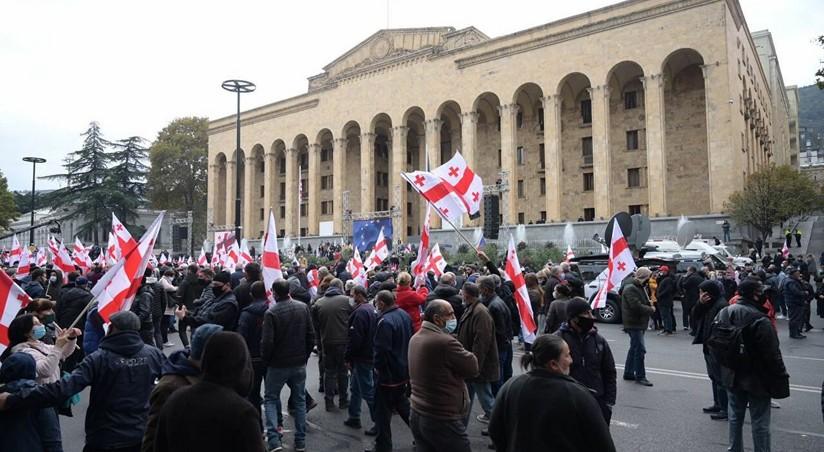West ready to turn Georgia into new conflict zone A potential “new Ukraine” or “Syria”?
For those who are following the political situation in Georgia based on Western media, it seems strange that the ruling party, the Georgian Dream, which is allegedly completely "pro-Russian" and "anti-European," enjoys significantly greater support from the population than other political forces.
Recently, the Imedi TV channel published the results of a public opinion poll conducted by GORBI ahead of the parliamentary elections, and the ratings were as follows:
-
Georgian Dream — 59.5%
-
Unity (National Movement, Strategy Aghmashenebeli, European Georgia) — 13.6%
-
Coalition for Change (Gvaramia, Melia, Girchi, Droa) — 10.3%
-
Strong Georgia (Lelo, For the People, Freedom Square, Citizens) — 4.5%
-
Gakharia — For Georgia — 3.8%
According to this voting forecast for the parliamentary elections on October 26, 2024, only the Georgian Dream is likely to achieve a constitutional majority in the parliament, while two opposition parties are projected to surpass the 5% threshold. This reveals the opposition's weak point — the lack of a clear leader and its "fragmentation," which raises the possibility that votes for the "low-rated" opposition forces will ultimately go to the Georgian Dream.
The results of the poll conducted by GORBI differ significantly from the data previously published by the opposition channel "Formula":
-
Georgian Dream – 33%
-
Unity (National Movement, Strategy Aghmashenebeli, European Georgia) – 19%
-
Coalition for Change (Gvaramia, Melia, Girchi, Droa) – 13%
-
Strong Georgia (Lelo, For the People, Freedom Square, Citizens) – 12%
-
Gakharia — For Georgia – 11%
However, even here, sociologists sympathetic to the opposition place the "Georgian Dream" in first place in terms of electoral support. They give it only 33%, but this is significantly higher than any individual opposition political force. Although, if we believe these ratings, all four main opposition parties surpass the 5% threshold and together garner 55%, which seems unlikely. It is worth noting that in previous elections, sociologists sympathetic to the opposition "predicted" ratings for it that were at least 1.5 to 2 times higher than what was ultimately counted in the votes.
So, what is the reason that Georgians support the ruling party, which is "cursed" by NGOs, opposition media, and almost all European politicians?
The reason is simple – the overt external pressure and attacks on Georgia from the West. This makes the Georgian Dream in the eyes of voters the main defender of Georgia's statehood, despite the opposition's assurances that the government has long "surrendered" this statehood to "Russia and Putin." The opposition seems to fail to understand that by welcoming Western sanctions against Georgia and emphasizing how the West will suppress the "Georgian Dream" and its leaders, it inadvertently convinces people that it is indeed the Georgian Dream that protects the national sovereignty of the country.

Georgians generally dislike being pressured or blackmailed. It doesn’t matter where the pressure originates—from Moscow, Washington, or Brussels. Any external pressure is perceived as an infringement on national sovereignty and identity, even if it is claimed to be "for the good of Georgia" and its "European choice." The imposition of "European values," especially when combined with LGBTQ+ issues, is increasingly viewed negatively by the majority of Georgia's residents.
Therefore, there is a strong possibility that following the European Parliament's resolution "on the democratic backsliding and threats to political pluralism in Georgia," support for the Georgian Dream will not decrease; rather, it may even increase. The European Parliament’s resolution effectively threatens Georgia not only with the freezing of aid and sanctions against Bidzina Ivanishvili and the leaders of the Georgian Dream but also with the cancellation of the visa-free regime with the EU. This could impact hundreds of thousands of Georgian citizens. The meaning behind such a threat is clear: the EU hopes that fearing the loss of the ability to travel to Europe, Georgians will vote against the Georgian Dream in the elections.
However, the effect could be the opposite, as the threat of cancelling the "visa-free regime with the EU" is perceived in Georgia more as blackmail and blatant external pressure with interference in the internal affairs of a sovereign state. Georgia has already encountered similar situations in its relations with Russia. Recall that against the backdrop of deteriorating relations with Tbilisi in 2006, Russian authorities deported Georgian citizens from their territory, and this action did not enhance Russia's popularity in Georgia. Similarly, if the EU cancels the visa-free regime for Georgian citizens and the situation escalates to the deportation of those who are illegally working in Europe, the negative sentiment will likely grow among the Georgian population not towards their own government, but towards the European Union.

Furthermore, Ukraine also has a formal visa-free regime with the EU, but this does not apply to men aged 18 to 60, who are simply not allowed to leave the war-torn country. If a "second front" opens in Georgia following an opposition takeover, similar exit restrictions could become a reality for Georgian citizens as well. Additionally, the European Parliament is essentially imposing a "mandatory change of government" on Georgia. Its resolution includes the following statement: "The European Parliament expects Georgian Dream to respect the will and free choice of the Georgian people in the upcoming parliamentary elections and ensure a peaceful transfer of power."
To demand a "transfer of power" from a political force that all polls predict will take first place in the elections is simply excessive! The EU doesn't even consider the possibility that the people of Georgia might vote for the current government, effectively "preemptively ignoring" the will of Georgian voters. Such a categorical demand for a mandatory transfer of power to the opposition before the elections has already provoked reactions from Georgian politicians.
In particular, Tbilisi Mayor Kakha Kaladze believes that the European Parliament's resolution is "not worth a dime," just like the opposition's claims for a transfer of power after the elections: "How can a party with a 4% rating talk about transferring power? They are afraid to meet the people because they know how the residents of our country feel about them. Are you comparing the National Movement with the Georgian Dream? Our situation is fundamentally different. It’s 2024, Georgia is developing, we are moving forward economically, democracy prevails in the country, and we have freedom of speech."
In principle, a stable economic situation and ongoing economic growth also contribute to the likelihood that the Georgian Dream will secure enough votes to maintain power. The main risk for the ruling party lies in the possibility that the opposition and the West will not recognize the election results. Public opinion is already being primed to suggest that the elections will allegedly be "falsified." As a result, there is a significant risk that either the opposition, having failed in the elections, will attempt to seize power through force, or it will create its own "parallel power structures." A "technical" or "shadow" government that the West might "recognize" poses a direct threat to the stability of the country and could invite external interference.

Western television channels deliberately did not cover the rallies in Tbilisi supporting the Georgian Dream or the generally pro-government demonstrations by the population and the Georgian Orthodox Church defending family and traditional values, which were much larger than most opposition events. The Georgian Orthodox Church, which supports the current authorities in their resistance to Western pressure, is regarded in all polls as the most authoritative public institution in the country. Therefore, any attempt by the opposition to forcibly change the government is likely to encounter significant resistance.
The potential for confrontation in Georgia after the elections carries the risk of external intervention. Especially considering that, amid the wars and conflicts in Ukraine and the Middle East, Georgia's role as a transit hub has increased significantly, and no one is willing to relinquish control over it. Additionally, we must not forget that certain forces in the West, primarily France, are creating a new hotspot for conflict by arming Armenia and supporting revanchist sentiments within the country. These forces also require Georgia for the transit of weapons and external "military assistance" in the event of a revanchist war.
For now, it is the Georgian Dream that provides the country with both dynamic economic development and a "balance of geopolitical interests" without clear confrontation with its neighbours. Any attempt to unconstitutionally remove this political force from power, especially if it receives a "vote of confidence" in the elections, carries unpredictable consequences. In the worst-case scenarios, Georgia could simultaneously become a "new Ukraine" and a "new Syria," with the difference being that Georgia's transit and strategic significance is much greater than that of these countries, despite its smaller territory. In such a case, the situation might not be limited to just a "second front" in the Ukrainian war. There is hope that awareness of this danger may deter even dissatisfied citizens from supporting the very likely scenario of a forceful change of government after the elections.
Vladimir Tskhvediani, Georgia, for Caliber.Az








